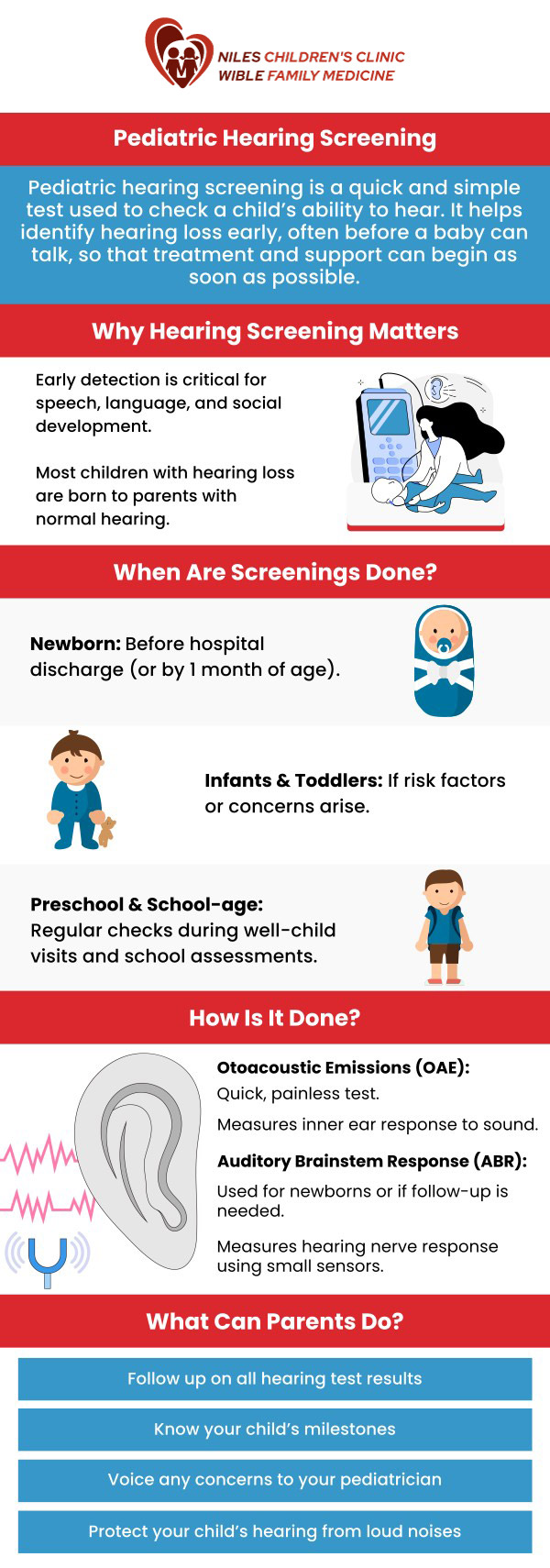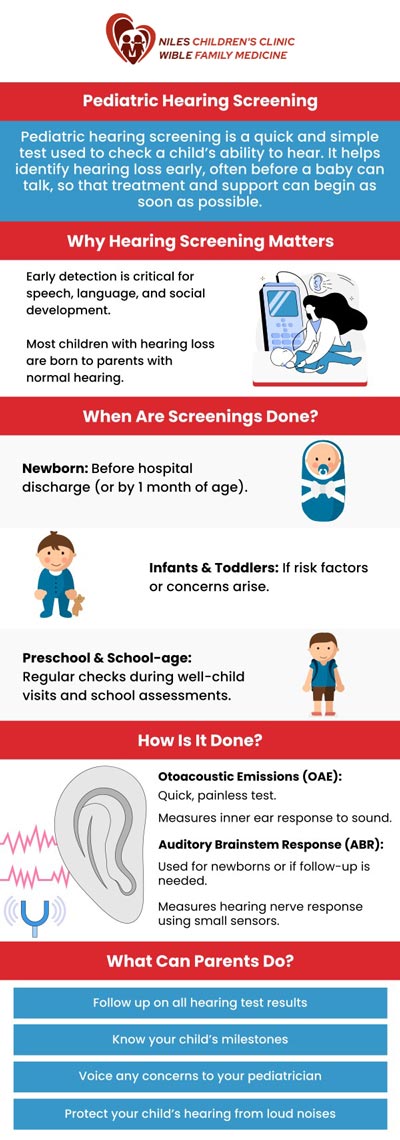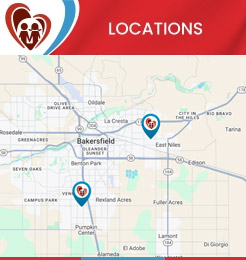Pediatric Hearing Screening at Niles Children’s Clinic in Bakersfield, CA
At Niles Children’s Clinic in Bakersfield, CA, we offer pediatric hearing screenings to ensure your child’s hearing health is on track. Our team provides thorough assessments to detect any hearing issues early. Early detection is key to addressing potential hearing problems that can impact your child’s speech and development. Trust our team to provide the care and attention your child deserves for optimal hearing health. For more information, contact us today or book an appointment online. We are conveniently located at 6055 Niles Street Bakersfield, CA 93306-4696.


Table of Contents:
Can newborns have their hearing screened?
How often should a child have their hearing screened?
Can a child pass a hearing screening but still have hearing loss?
What types of hearing loss can be detected in children?
All newborns should have their hearing screened soon after birth, and our practice is committed to providing this important service. Hearing screenings are quick, safe, and painless for your baby. We use reliable methods, which can be performed while your baby is asleep or resting comfortably.
Early detection of hearing loss is crucial, as it allows us to begin timely interventions that support your child’s language, social, and cognitive development. If your newborn does not pass the initial screening, we will work closely with you to arrange further evaluation and determine the next steps.
We recommend that hearing screening be completed within the first month of life, with any necessary follow-up starting as soon as possible. At Universal Pediatrics, your child’s health and development are our top priorities, and we are here to guide you through every step of early care—including newborn hearing screening.
At Universal Pediatrics, we understand that your child’s hearing is essential for healthy speech, language, and social development. That’s why we prioritize regular hearing screenings as a key part of our well-child care.
We follow the latest guidelines to ensure your child’s hearing is checked at important milestones. Every newborn should have their hearing screened before leaving the hospital or within the first month of life. If your child passes this initial screening and has no additional risk factors, we will continue to monitor their hearing as part of their routine checkups—typically at ages 4, 5, 6, 8, and 10. These screenings may take place during regular well-child visits or as part of school health programs.
Some children may need more frequent hearing tests. If your child has a family history of hearing loss, was born prematurely, experienced certain infections, or has been exposed to loud noises, our team may recommend additional screenings to ensure early detection of any issues.
If you notice signs that your child might be having trouble hearing—such as not responding to sounds, delayed speech, or difficulty following directions—please let us know. We encourage parents, caregivers, and teachers to share any concerns so we can arrange a prompt hearing evaluation.
Hearing screenings are valuable tools we use in our practice to quickly identify children who may need further evaluation. However, these screenings are not as detailed as a full hearing assessment performed by an audiologist. Screenings often use limited frequencies or sound levels, which means they might miss mild hearing loss, certain types of hearing loss like auditory neuropathy, or loss that affects only specific ranges of sound. In addition, some hearing issues—such as those caused by intermittent ear infections or fluid—may not be present during the time of screening and so can be overlooked.
At Universal Pediatrics, we encourage parents and caregivers to remain observant. If you notice signs such as delayed speech, inattentiveness, or your child frequently asking for repetition, it is important to let us know. Sometimes, even if a child has passed a routine hearing screening, these signs may indicate an underlying hearing problem that requires a more comprehensive evaluation.
Early detection and intervention are essential for your child’s language, social, and academic success. Our team is here to support your child’s health and development every step of the way.
● Conductive hearing loss occurs when sound waves cannot efficiently travel through the outer or middle ear to the inner ear. This type is often caused by factors like ear infections, fluid in the ear, impacted earwax, or abnormalities in the ear’s structure. Conductive hearing loss is usually treatable with medical intervention or surgery.
● Sensorineural hearing loss results from damage to the inner ear (cochlea) or the auditory nerve. It can be congenital (present at birth) or acquired later due to infections, injury, or exposure to loud noise. Sensorineural hearing loss is typically permanent, but hearing aids or cochlear implants may help improve hearing ability.
In some cases, children may experience mixed hearing loss, which is a combination of both conductive and sensorineural issues. Early detection through newborn hearing screenings and regular check-ups is crucial, as untreated hearing loss can affect language development, academic performance, and social skills.
If you have concerns about your child’s hearing, our caring team at Universal Pediatrics is here to guide you through every step—from screening and diagnosis to treatment and ongoing support. For more information, contact us today or book an appointment online. We are conveniently located at 6055 Niles Street Bakersfield, CA 93306-4696. We serve patients from Bakersfield CA, Maltha CA, Kayandee CA, Burness CA, Clovis CA, Panama CA, Alameda CA, and surrounding areas.


Additional Services You May Need
▸ Well-Child Visits
▸ Sick Visits
▸ Immunizations
▸ Chronic Disease Management
▸ Newborn Care
▸ Developmental Screenings
▸ School Physicals
▸ Nutritional Counseling
▸ Behavioral Health Support
▸ Hearing and Vision Screenings
▸ Lactation Support
▸ All Services






